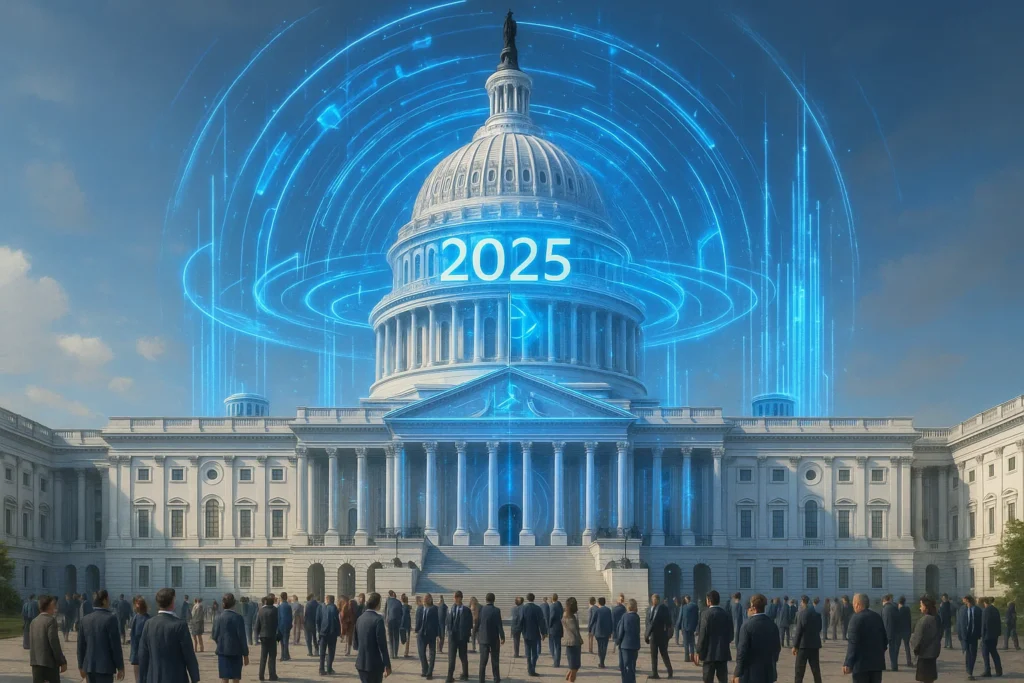Microsoft Copilot AI enters U.S. Congress in 2025, marking a major step in digital government transformation. Here’s what it means for policy, tech, and citizens.
Introduction: A Landmark Moment for AI and Government
In 2025, the U.S. Congress officially introduced Microsoft Copilot AI into its legislative and administrative processes, setting a precedent for how government institutions adopt cutting-edge technology. For years, Copilot has been a productivity tool for businesses, enterprises, and individuals, but its entry into one of the most powerful governing bodies in the world signals a historic turning point in digital transformation.
This move reflects a global trend where governments are embracing artificial intelligence (AI) not only for efficiency but also for transparency, accessibility, and national competitiveness. As the U.S. government takes this leap, the implications reach far beyond politics—they touch citizens, enterprises, researchers, and global policy frameworks.
So, what does Microsoft Copilot AI in Congress really mean for America in 2025? Let’s break it down.
The Road to AI in Congress: Why Now?
From Business Tool to Political Assistant
Microsoft Copilot AI was first designed to integrate with Microsoft 365 tools like Word, Outlook, and Teams. Over time, it became more than just a writing or coding assistant—it turned into a decision-support system, capable of parsing complex data, summarizing reports, and even suggesting policy insights.
Congress has long struggled with information overload, where thousands of bills, amendments, and reports flood legislative offices every year. Traditional staff support, while essential, has often been overwhelmed. Copilot provides an answer:
- Automated Summaries → Condensing 300-page reports into digestible briefs.
- Real-Time Data Analysis → Turning raw statistics into actionable insights.
- Natural Language Queries → Allowing lawmakers to ask direct questions like, “What are the economic impacts of this bill on small businesses in Texas?”
The Push for Digital Transformation in Government
For decades, U.S. government IT systems were criticized for being outdated. In 2025, the digital government transformation movement is finally accelerating. Copilot’s introduction aligns with:
- Federal Digital Strategy 2025, which prioritizes modernization.
- Cybersecurity mandates requiring secure, AI-powered systems.
- Public demand for faster, more transparent governance.
By adopting Copilot, Congress is signaling a willingness to experiment, innovate, and modernize its functions.
How Microsoft Copilot AI Works in Congress
Legislative Drafting & Bill Analysis
One of the most time-consuming processes in Congress is drafting and reviewing bills. Copilot is now being used to:
- Generate draft bill text based on lawmakers’ notes.
- Compare new bills with existing laws to detect conflicts.
- Suggest amendments to strengthen legal language.
Committee Hearings & Research
Committees rely heavily on research staff. With Copilot:
- Hearing transcripts can be automatically summarized.
- Key talking points are extracted for lawmakers.
- Fact-checking is assisted by cross-referencing government databases.
Communication & Public Engagement
Congressional offices spend countless hours responding to citizens. Copilot is streamlining:
- Drafting responses to constituent emails.
- Translating policy proposals into plain language for public understanding.
- Automating routine correspondence while keeping staff focused on high-level strategy.
AI-Powered Decision Support
Beyond admin work, Copilot assists lawmakers by:
- Providing real-time economic models of proposed legislation.
- Highlighting legal precedents that may be affected.
- Offering comparisons of international policies for global perspective.
Benefits of Copilot AI in Congress
1. Increased Efficiency
- Faster bill analysis saves time and resources.
- Routine tasks are automated, freeing staff for strategic work.
2. Better Policy Outcomes
- Lawmakers get clearer insights into complex issues.
- Data-driven decisions reduce reliance on outdated information.
3. Transparency & Accessibility
- Citizens can access simplified policy summaries.
- AI reduces bureaucratic delays, fostering trust in government.
4. Cost Savings
- By automating repetitive tasks, Congress saves millions annually.
- Reduced paperwork means lower administrative overhead.
Challenges & Concerns
Bias and Fairness
AI models are only as good as their training data. Critics worry that Copilot may amplify biases, affecting legislative priorities.
Data Security
Congress deals with sensitive national data. Ensuring Copilot doesn’t become a cybersecurity vulnerability is critical.
Over-Reliance on AI
If lawmakers depend too heavily on Copilot, human judgment could be sidelined. AI should guide, not govern.
Public Trust
Skeptics fear AI in Congress could create a sense of “machine governance.” Lawmakers must reassure citizens that humans remain in control.
Global Implications: The U.S. as a Model for AI in Government
The U.S. Congress adopting Microsoft Copilot AI will set an international benchmark. Other countries are already experimenting:
- UK Parliament → Testing AI assistants for public policy analysis.
- EU Commission → Using AI for regulatory compliance checks.
- Singapore → Employing AI for citizen services.
America’s move signals leadership in AI governance adoption, shaping how democracies worldwide integrate technology.
What This Means for Different Stakeholders
For Policymakers
- Access to better data for smarter legislation.
- Opportunity to set ethical AI governance standards globally.
For Government Officials
- Reduced workload in administrative tasks.
- Faster responses to citizen concerns.
For Enterprises
- A chance to collaborate with government on AI projects.
- More transparency in policymaking benefiting businesses.
For AI Researchers & Tech Leaders
- Real-world application of large language models at scale.
- Insights into ethical frameworks for AI use in governance.
For Citizens
- Faster access to simplified policy updates.
- Potentially more responsive governance in daily life.
Microsoft’s Role in Shaping Government AI
Microsoft has positioned itself as a trusted AI partner for governments. With Copilot, it emphasizes:
- Responsible AI Frameworks ensuring fairness and accountability.
- Enterprise-grade security designed for sensitive environments.
- Continuous updates so Congress stays at the forefront of technology.
Case Study: First Uses of Copilot in Congress (2025)
- Bill Summaries: In January 2025, Copilot summarized a 700-page defense budget proposal into a 5-page policy brief.
- Constituent Engagement: A Senator’s office used Copilot to handle 10,000 citizen emails in one week without losing personalization.
- Committee Hearings: During a healthcare debate, Copilot fact-checked claims against CDC databases in real time.
These examples show Copilot moving from theory to tangible impact.
Ethical & Legal Framework for AI in Congress
To address concerns, the U.S. is creating an AI Governance Charter for government use. Key principles:
- Human Oversight → No AI-driven decisions without human approval.
- Bias Audits → Regular testing for fairness and accuracy.
- Data Security Mandates → Strict protection of sensitive government data.
- Transparency → Public disclosure when AI is used in legislative work.
Looking Ahead: The Future of AI in U.S. Government
By 2030, experts predict AI will be integrated into nearly every federal agency. Potential future uses:
- AI-assisted budgeting for federal spending.
- Predictive modeling for disaster response.
- Enhanced digital services for Social Security, healthcare, and taxation.
Microsoft Copilot in Congress is just the beginning of a long-term digital transformation journey.
Conclusion: A Defining Step for American Democracy
The introduction of Microsoft Copilot AI into the U.S. Congress in 2025 marks a historic milestone in government modernization. It represents not just technological adoption, but a redefinition of governance itself—where efficiency, transparency, and citizen engagement stand at the center.
Yet, this journey comes with challenges: ensuring fairness, protecting data, and maintaining human judgment. If handled responsibly, Copilot’s role in Congress could strengthen democracy, making the government more responsive to the people it serves.
In the years ahead, the U.S. Congress will be studied worldwide as a pioneer in AI-driven governance, shaping the future of digital democracy.
FAQs
1. What is Microsoft Copilot AI?
Microsoft Copilot AI is an AI assistant integrated with Microsoft 365 tools, designed to help with writing, research, data analysis, and decision support.
2. Why is Congress adopting Copilot AI?
To improve efficiency, transparency, and decision-making while reducing administrative workloads.
3. Will AI replace lawmakers?
No, Copilot is an assistant. All final decisions remain with elected officials.
4. Is Copillot safe for government use?
Yes, Microsoft provides enterprise-grade security, though cybersecurity remains an ongoing concern.
5. What does this mean for citizens?
It means faster communication, clearer policy summaries, and potentially more responsive governance.

